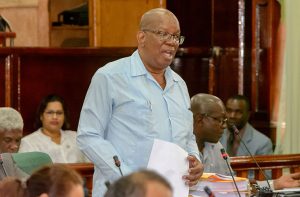THE National Assembly on Tuesday passed the Customs (Amendment) Bill paving the way for the imposition of an environmental levy of $10 per unit on the importers and local manufacturers of products using non-returnable metal, plastic or glass container to package any alcoholic or non-alcoholic beverage.The amendment to the Customs Act comes on the heels of a 2014 ruling by the Caribbean Court of Justice (CCJ) which resulted in Guyana refunding Rudisa Beverages and Juices N.V a total of $1.2B for environmental taxes collected from that company.
Rudisa had contended, and the court ruled, that the tax violated the rules of trading in the regional trade and integration bloc, CARICOM, of which both Guyana and Suriname are members.
As such, it was viewed that collection of the Environmental Tax from CARICOM importers and not local manufacturers was a violation of the Treaty of Chaguaramas, which guarantees the free movement of goods and prohibits import duties on CARICOM goods.
In the House on Thursday, Finance Minister Winston Jordan, in defending the bill, said it allows for the imposition of a broad-based, non-discriminatory environmental tax that will prevent a re-occurrence.
Minister Jordan said the argument that the tax will result in increased cost to the producer and importer and will likely be passed onto consumers, is flawed, as he pointed to sections of the amended legislation.

“For those units that are proven to the satisfaction of the commissioner-general as having been returned reused, recycled, or re-exported a credit will be allowed towards the next payment due and excess credit shall be carried forward to the next period until the credit has been fully utilised,” the bill states.
The Finance Minister reassured the House that “no one will be bearing this cost if the particular container is returned, reused, recycled or re-exported. They will get back their money.”
PART OF GREEN AGENDA
Additionally, he said this measure forms part of the Government’s green agenda, and as such, seeks to protect the environment.
“One just have to look at the unsightly evidence of plastic, glass and other containers being disposed of in a haphazard and dangerous manner in Guyana, leading to clogged drains, canals, rivers. These remind us of the damage and danger posed by this indiscriminate disposal,” he said. He added: “when we protect the environment, we are protecting ourselves and the future.”
People’s Progressive Party (PPP) Member of Parliament (MP) Bishop Juan Edghill, offering his contribution to the debate, recalled that legislation was enacted in 1995, putting in place an environmental tax.
“At that time, that levy was only charged to importers who were bringing beverages in containers that were not biodegradable,” he said.
However, he said Guyana was taken to court over the imposition of this Environmental Tax on importers within the regional bloc.
The PPP MP said in 2013 and 2014, the then Government (PPP) had made two attempts to put the requisite legislation in place to ensure that the country was in compliance with the Revised Treaty of Chaguaramas, but those attempts were overturned by the then one-seat-majority Opposition.
He noted that the PPP/C Government had intended to reduce the Environmental Tax to $5, which would have been applied to both local manufacturers and importers, but that proposal was rejected.
Bishop Edghill said at the time, there were suggestions from the then Opposition that the Environmental Tax be removed all together.
“There were suggestions that we don’t even have to collect the tax, because the feeling and the view is that the tax was not necessary; the question that must be asked is, what has changed? In 19 months, what has changed.”
A BURDEN
Edghill’s colleague, Anil Nandlall, told the House that the Government is placing greater burdens on the people of Guyana.
“Not only are we going to pay VAT on water, we are going to pay tax on the container [in] which the water is contained,” the PPP front bencher told his colleagues on both sides of the House.
According to him, the Finance Minister has given false hope to the people, contending that it will be even more costly to reclaim the $10 for every unit non-returnable metal, plastic or glass container used to package any alcoholic or non-alcoholic beverage.
“Businesses that have containers brought into country long before the law takes effect will now be subject to the tax,” Nandlall contended. He lamented that Government is making this imposition without much-needed consultation with the private sector and other key stakeholders, although, when in Opposition, it had lobbied the then Government to consult with the commercial sector.
In response, Minister Jordan told the House that the environmental levy presented in the House is different from the one imposed by the PPP Government.
“This measure is different from the previous measure that was in place, in at least two ways: one, this is non-discriminatory, it is applied across the board to both local manufacturers, local producers and importers and the second point is, this is not a measure designed to have Government add to its coffers,” he posited.
The Finance Minister pointed out that the Government since 2016 has been putting the necessary measures in place to protect the environment. He pointed out that there are restrictions on the importation of used and reconditioned vehicles; a ban on Styrofoam used in the packaging of beverage, food and food production and exemption on all biodegradable products used to package food and beverages.



.jpg)









